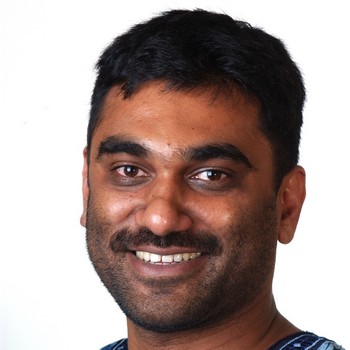DOCTOR OF LAW (HONORIS CAUSA)
 Kumi Naidoo was born in South Africa in 1965 and became involved in South Africa's liberation struggle at the age of 15 when he joined the Helping Hands Youth Organisation (an affiliate of the South African Youth Congress). After being expelled from secondary school for protesting against Apartheid education in 1981, he received his SAT School Leaving Certificate through self-study, with a merit pass and matriculation exemption. He enrolled for a BA (Law) degree at the University of Durban-Westville and graduated in 1985. In 1987 he received his honours degree cum laude.
Kumi Naidoo was born in South Africa in 1965 and became involved in South Africa's liberation struggle at the age of 15 when he joined the Helping Hands Youth Organisation (an affiliate of the South African Youth Congress). After being expelled from secondary school for protesting against Apartheid education in 1981, he received his SAT School Leaving Certificate through self-study, with a merit pass and matriculation exemption. He enrolled for a BA (Law) degree at the University of Durban-Westville and graduated in 1985. In 1987 he received his honours degree cum laude.
After the Apartheid government imposed a State of Emergency, Kumi was arrested numerous times, charged for violating State of Emergency provisions against mass mobilisation and civil disobedience. Police harassment eventually forced him to go underground before fleeing to the UK in 1987 while on trial for violating state of emergency regulations. He spent his time in exile at Oxford University as a Rhodes Scholar, earning a doctorate in political sociology, as well as being a Visiting Scholar at Yale University.
After Nelson Mandela’s release from prison in 1990, Kumi returned to South Africa to work on the legalisation of the ANC. Staying out of government and focusing on one of the worst legacies of the Apartheid system, mass illiteracy, from 1990 to 1996 he worked in adult basic education during which time he also led the training of 300 000 South Africans as Director of Training at the Independent Electoral Commission (IEC) who conducted the first democratic elections. He was founding executive director of the South African National NGO Coalition (SANGOCO), whose mandate is to ensure that the traditions of civil society continue to serve the people of SA. In addition, he held several leadership positions on a wide range of education, development, and social justice initiatives, including the 1997 National Men’s March against Violence against Women and Children, and as the official spokesperson for the 1994 IEC. He served for several years as board member of the International Association for Women’s Rights in Development.
From 1998 to 2008, Kumi was Secretary General and Chief Executive Officer of Johannesburg-based Civicus: World Alliance for Citizen Participation, dedicated to strengthening citizen action and civil society worldwide. He was also founding chairperson of the Global Call to Action against Poverty since its inception in 2004 where he continues to serve as Global Ambassador.
In 2008 and 2009 he served as Honorary President of CIVICUS and took a sabbatical to write a book on the state of civil society worldwide and to support other CIVICUS work, including working in “hotspots” such as Zimbabwe, serving on the UNDP Civil Society Advisory Committee, as chair of the Global Coalition for Climate Action (GCCA), board member of the Global Reporting Initiative and Food & Trees for Africa. In 2009 Kumi was appointed as the International Executive Director for Greenpeace International where he currently serves in this role. His book, Boiling Point: Can Citizen Action Save the World?, predicted the explosion of citizen action as witnessed by the Arab spring and the Occupy Movement.
In recognition of his unique contribution to the empowerment of civil society to transform South African and international legal orders with a view to protecting human rights, eradicating poverty, promoting environmental sustainability and addressing the challenges of global change on an equitable, peaceful and sustainable basis, it is an honour for NMMU to confer the degree of Doctor of Law (honoris causa) on KUMI NAIDOO.